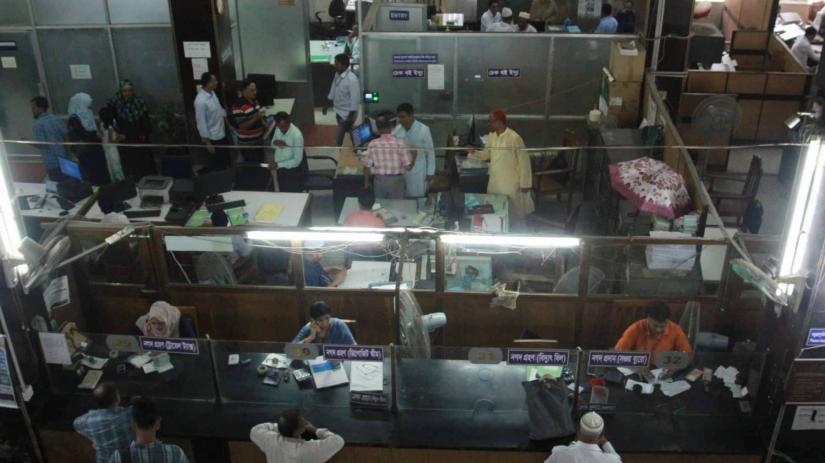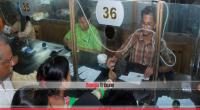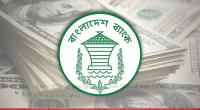 Despite having funds to the amount of Tk 504.3 billion, banks are unable to distribute it among their clients. The banks are forced to keep this money as ‘provision’ against default loan, informs a Bangladesh Bank report.
Despite having funds to the amount of Tk 504.3 billion, banks are unable to distribute it among their clients. The banks are forced to keep this money as ‘provision’ against default loan, informs a Bangladesh Bank report.
As per central bank rules, other banks have to keep one hundred per cent provision against bad loans.
The provision against suspicious loans is 50 per cent and low quality loan 20 per cent.
Central bank report says that in 2018, the most asset devaluation has happened in the case of government banks; due to their overall weak management and lack of skills, the quality of asset has fallen.
Former governor of Bangladesh Bank, Dr. Salehuddin Ahmed, says: “Due to weak management, banks are facing problem and MDs of banks are responsible for the rise of default loans.”
Central bank report states that since default loan has soared, the need to keep more provision has also risen. In 2011, the provision was only Tk 150 billion and in 2018, the instruction for provision was Tk 570.4 billion.
Of this, banks only managed to keep Tk 504.3 billion.
So the provision deficit is still Tk. 66.1 billion.
Central Bank report also states that to maintain provision, net profit has fallen by 57 percent. In 2018, net profit was Tk 40.4 billion which was Tk 83.1 billion in 2016.
The provision money is from the bank’s capital and there is no income from it and this amount cannot be disbursed as loan.
The Bangladesh Bank report also mentions that loan has risen in the financial sector.
When the housing bubble burst in 2007-08, a financial crisis was created from the USA because US banks gave indiscriminate loans for buying houses but did not have enough deposit against them.
At that time, banks started selling assets which increased risk.
Chairman of the Association of Bankers, ABB and MD of Dhaka Bank, Syed Mahbubur Rahman, observes: “We are trying to lower default loans; banks with high loans have money locked in provision.”
The report however, mentions the spread of banking in rural areas.
As per the report, in South Asia, the net default loan rate in Bangladesh is 2.2 percent, in India, 5 percent, 2.5 percent in the Maldives and Sri Lanka and 1 percent in Malaysia.
Meanwhile, loan takers are tilting towards re-scheduling; in 2018, Tk 232.1 billion was re-scheduled, which is 24 percent higher than the previous year. In the last five years, 2018 saw the highest amount being re-scheduled.
 Business
Business
30730 hour(s) 8 minute(s) ago ;
Morning 05:02 ; Friday ; Apr 19, 2024
Banks still grappling with delinquent loans; re-scheduling high
Send
Golam Mowla
Published : 07:30, Jun 11, 2019 | Updated : 16:15, Jun 11, 2019
Published : 07:30, Jun 11, 2019 | Updated : 16:15, Jun 11, 2019
0 ...0 ...
/tf/
Topics: Top StoriesExclusive
- KOICA donates medical supplies to BSMMU
- 5 more flights to take back British nationals to London
- Covid19: Rajarbagh, Mohammadpur worst affected
- Momen joins UN solidarity song over COVID-19 combat
- Covid-19: OIC to hold special meeting
- WFP begins food distribution in Cox’s Bazar
- WFP begins food distribution in Cox’s Bazar
- 290 return home to Australia
- Third charter flight for US citizens to return home
- Dhaka proposes to postpone D8 Summit
Unauthorized use of news, image, information, etc published by Bangla Tribune is punishable by copyright law. Appropriate legal steps will be taken by the management against any person or body that infringes those laws.
Bangla Tribune is one of the most revered online newspapers in Bangladesh, due to its reputation of neutral coverage and incisive analysis.
F R Tower, 8/C Panthapath, Shukrabad, Dhaka-1207 | Phone: 58151324; 58151326, Fax: 58151329 | Mob: 01730794527, 01730794528






